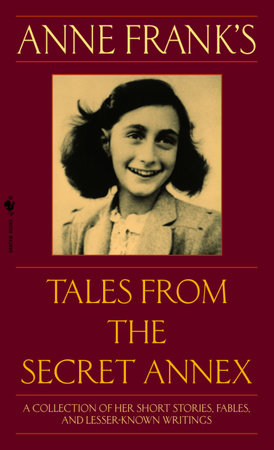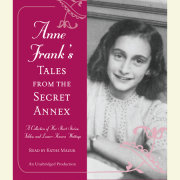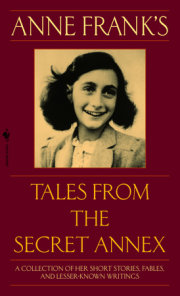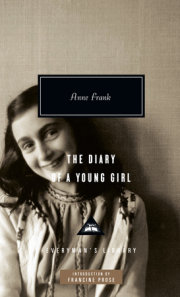Was There a Break-in?
Wednesday evening, March 24, 1943
Mother, Father, Margot and I were sitting quite pleasantly together when Peter suddenly came in and whispered in Father's ear. I caught the words "a barrel falling over in the warehouse" and "someone fiddling with the door."
Margot heard it too, but was trying to calm me down, since I'd turned white as chalk and was extremely nervous. The three of us waited. In the meantime Father and Peter went downstairs, and a minute or two later Mrs. van Daan came up from where she'd been listening to the radio. She told us that Pim had asked her to switch it off and tiptoe upstairs. But you know what happens when you're trying to be quiet--the old stairs creaked twice as loud. Five minutes later Peter and Pim, the color drained from their faces, appeared again to relate their experiences.
They had positioned themselves under the staircase and waited. Nothing happened. Then all of a sudden they heard a couple of bangs, as if two doors had been slammed shut inside the house. Pim bounded up the stairs, while Peter went to warn Dussel, who finally presented himself upstairs, though not without kicking up a fuss and making a lot of noise. Then we all tiptoed in our stockinged feet to the van Daan family on the next floor. Mr. van D. had a bad cold and had already gone to bed, so we gathered around his bedside and discussed our suspicions in a whisper.
Every time Mr. van D. coughed loudly, Mrs. van D. and I nearly had a nervous fit. He kept coughing until someone came up with the bright idea of giving him codeine. His cough subsided immediately.
Once again we waited and waited, but heard nothing. Finally we came to the conclusion that the burglars had fled when they heard footsteps in an otherwise quiet building. The problem now was that the chairs in the private office were neatly grouped round the radio, which was tuned to England. If the burglars had forced the door and the air-raid wardens were to notice it and call the police, that would get the ball rolling, and there could be very serious repercussions. So Mr. van Daan got up, pulled on his coat and pants, put on his hat and cautiously followed Father down the stairs, with Peter (armed with a heavy hammer, to be on the safe side) right behind him. The ladies (including Margot and me) waited in suspense until the men returned five minutes later and told us that there was no sign of any activity in the building. We agreed not to run any water or flush the toilet; but since everyone's stomach was churning from all the tension, you can imagine the stench after we'd each had a turn in the bathroom.
Incidents like these are always accompanied by other disasters, and this was no exception. Number one: the Westertoren bells stopped chiming, and they were always so comforting. Plus Mr. Voskuijl left early last night, and we weren't sure if he'd given Bep the key and she'd forgotten to lock the door.
Well, the night had just begun, and we still weren't sure what to expect. We were somewhat reassured by the fact that between eight-fifteen--when the burglar had first entered the building--and ten-thirty, we hadn't heard a sound. The more we thought about it, the less likely it seemed that a burglar would have forced a door so early in the evening, when there were still people out on the streets. Besides that, it occurred to us that the warehouse manager at the Keg Company next door might still have been at work. What with the excitement and the thin walls, it's easy to mistake the sounds. Besides, your imagination often plays tricks on you in moments of danger.
So we lay down on our beds, though not to sleep. Father and Mother and Mr. Dussel were awake most of the night, and I'm not exaggerating when I say that I hardly got a wink of sleep. This morning the men went downstairs to see if the outside door was still locked, but all was well!
Of course, we gave the entire office staff a blow-by-blow account of the incident, which had been far from pleasant. It's much easier to laugh at these kinds of things after they've happened, and Bep was the only one who took us seriously.
Note: The next morning the toilet was clogged, and Father had to stick in a long wooden pole and fish out several pounds of excrement and strawberry recipes (which is what we use for toilet paper these days). Afterward we burned the pole.
The Dentist
Wednesday, December 8, 1942
The nicest spectacle I've ever seen here took place today: Mother was ironing and Mrs. van Daan was scheduled for a dental appointment. Dussel began unpacking his case with an air of importance (it was the first time he'd worked on anyone here), and he needed some eau de cologne, which could be used as a disinfectant, and vaseline, which would have to do for wax. Mrs. van D. sat down, and he started looking in her mouth, but every time he touched a tooth, the poor woman flinched and uttered incoherent cries. After a lengthy examination (lengthy as far as Mrs. van D. was concerned, since it actually took no longer than two minutes), Dussel began to scrape out a cavity. But Mrs. van D. had no intention of letting him. She flailed her arms and legs until Dussel finally let go of his probe and . . . it remained stuck in Mrs. van D.'s tooth. That really did it! Mrs. van D. lashed out wildly in all directions, cried (as much as you can with an instrument like that in your mouth), tried to remove it, but only managed to push it in even farther. Mr. Dussel calmly observed the scene, his hands on his hips, while the rest of the audience roared with laughter. Of course, that was very mean of us. If it'd been me, I'm sure I would have yelled even louder. After a great deal of squirming, kicking, screaming and shouting, she finally managed to yank the thing out, and Mr. Dussel calmly went on with his work as if nothing had happened. He was so quick that Mrs. van D. didn't have time to pull any more shenanigans. But then, he had more help than he's ever had before: no fewer than two assistants; Mr. van D. and I performed our job well. The whole scene resembled one of those engravings from the Middle Ages, the kind showing a quack at work. In the meantime, however, the patient was getting restless, since she had to keep an eye on "her" soup and "her" food. One thing is certain: Mrs. van D. will never make another dental appointment!
Sausage Day
Friday, December 10, 1942
Mr. van Daan had a large amount of meat. Today he wanted to make bratwurst and sausages, and tomorrow mettwurst. It's fun watching him put the meat through the grinder: once, twice, three times. Then he adds all kinds of ingredients to the meat and uses a long pipe, which he attaches to the grinder, to force it into the casings. We ate the bratwurst with sauerkraut (served with onions and potatoes) for lunch, but the sausages were hung to dry over a pole suspended from the ceiling. Everyone who came into the room burst into laughter when they saw those dangling sausages. It was such a comical sight.
The place was a shambles. Mr. van Daan, clad in his wife's apron and looking fatter than ever, was concentrating his hefty form on the meat. What with his bloody hands, red face and apron, he really looked like a butcher. Mrs. van D. was trying to do everything at once: learn Dutch, cook, watch, sigh, moan--she claims to have broken a rib. That's what happens when you do such stupid physical exercises. Dussel had an eye infection and was sitting next to the stove dabbing his eye with camomile tea. Pim, seated in the sunshine, kept having to move his chair this way and that to stay out of the way. His back must have been bothering him, because he was sitting slightly hunched over with an agonized expression on his face. He reminded me of those aged invalids you see in the poorhouse. Peter was romping around the room with the cat, holding out a piece of meat and then running off with the meat still in his hands. Mother, Margot and I were peeling potatoes. When you get right down to it, none of us were doing our work properly, because we were all so busy watching Mr. van Daan.
The Flea
Wednesday, July 7, 1943
We're being plagued with yet another problem: Mouschi's fleas. We didn't know that people could be bitten by cat fleas, but they can.
Yesterday when I was upstairs I found a flea on my leg, ten minutes later when I was downstairs I nabbed another one, and last night when I was sitting on Dussel's bed, I felt another one crawling down my leg, but the little critter slipped through my fingers--they're incredibly fast. This morning I was getting dressed over by the closet when I saw another one of those wondrous creatures, walking along as pretty as you please. A flea that walks as well as jumps is a new experience for me. I picked it up and squeezed as hard as I could, but Mr. Flea hopped away again. Sighing, I got undressed and subjected my naked body and my clothes to a thorough examination until I finally found the flea in my panties. A second later, it was off with his head.
Do You Remember?
Memories of my schooldays at the Jewish Lyceum
Do you remember? I've spent many a delightful hour talking about school, teachers, adventures and boys. Back when our lives were still normal, everything was so wonderful. That one year of Lyceum was heaven to me: the teachers, the things I learned, the jokes, the prestige, the crushes, the admirers.
Do you remember? When I came back from town that afternoon and found a package in the mailbox from "un ami, R." It could only have come from Rob Cohen. Inside there was a brooch worth at least two and a half guilders. Ultra-modern. Rob's father sold that kind of stuff. I wore it for two days, and then it broke.
Do you remember? How Lies and I told on the class. We had a French test. I wasn't having too much trouble with it, but Lies was. She copied my answers and I went over them to make corrections (on her test, I mean). She got a C+ and I got a C-, since thanks to my help she had gotten some things right, but both grades had been crossed out and replaced with a big fat F. Great indignation. We went to Mr. Premsela to explain what had happened, and at the end Lies said, "Yes, but the entire class had their books open under their desks!" Mr. Premsela promised the class that nobody would be punished if all those who had cheated would raise their hands. About ten hands went up--less than half the class, of course. A few days later Mr. Premsela sprang the test on us again. Nobody would talk to Lies and me, and we were branded as snitches. I soon caved in under the pressure and wrote a long letter of apology to Class 1 L II, begging their forgiveness. Two weeks later all had been forgotten.
The letter went something like this:
To the students in Class 1 L II,
Anne Frank and Lies Goslar hereby offer their sincere apologies to the students in Class 1 L II for their cowardly act of betrayal in the matter of the French test.
However, the deed was done before we had time to think, and we freely admit that we alone should have been punished. We believe that everyone is liable to let a word or sentence slip out in anger from time to time, and this can result in an unpleasant situation, even though it wasn't meant to. We hope that Class 1 L II will see the incident in this light and will repay evil with good. There's nothing more to be gained by it, and the two guilty parties can't undo what's been done.
We wouldn't be writing this letter if we weren't genuinely sorry for what happened. Furthermore, we ask those of you who have been ignoring us to please stop, since what we did wasn't so bad as to justify being looked upon as criminals for all eternity.
Anyone who is unable to put this matter behind them should come to us and either give us a good scolding or ask us for a favor, which we will gladly grant, if at all possible.
We trust that everyone in Class 1 L II will now be able to forget the affair.
Anne Frank and
Lies Goslar
Do you remember? How C.N. told Rob Cohen in the streetcar, within earshot of Sanne Ledermann who passed it on to me, that Anne had a much prettier face than J.R., especially when she smiled. Rob's answer was, "Boy, have you ever got big nostrils, C.!"
Do you remember? How Maurice Coster was planning to present himself to Pim to ask his permission to see his daughter.
Do you remember? How Rob Cohen and Anne Frank exchanged a flurry of letters when Rob was in the hospital.
Do you remember? How Sam Solomon always followed me on his bicycle and wanted to walk arm in arm with me.
Do you remember? How A.W. kissed me on the cheek when I promised not to tell a soul about E.G. and him.
I hope that such happy, carefree schooldays will come again.
The Best Little Table
Tuesday, July 13, 1943
Yesterday afternoon Father gave me permission to ask Dussel whether he would please be so good as to allow me (see how polite I am?) to use the table in our room two afternoons a week, from four to five-thirty. I already sit there every day from two-thirty to four while Dussel takes a nap, but the rest of the time the room and table are off-limits to me. It's impossible to study next door in the afternoon, because there's too much going on. Besides, Father sometimes likes to sit at the desk during the afternoon.
So it seemed like a reasonable request, and I asked Dussel very politely. What do you think the learned gentleman's reply was? "No." Just plain "No!"
I was incensed and wasn't about to let myself be put off like that. I asked him the reason for his "No," but this didn't get me anywhere. The gist of his reply was: "I have to study too, you know, and if I can't do that in the afternoons, I won't be able to fit it in at all. I have to finish the task I've set for myself; otherwise there's no point in starting. Besides, you aren't serious about your studies. Mythology--what kind of work is that? Reading and knitting don't count either. I use that table and I'm not going to give it up!"
Copyright © 2003 by Anne Frank; edited by Gerrold van der Stroom and Susan Massotty; translated by Susan Massotty. All rights reserved. No part of this excerpt may be reproduced or reprinted without permission in writing from the publisher.








